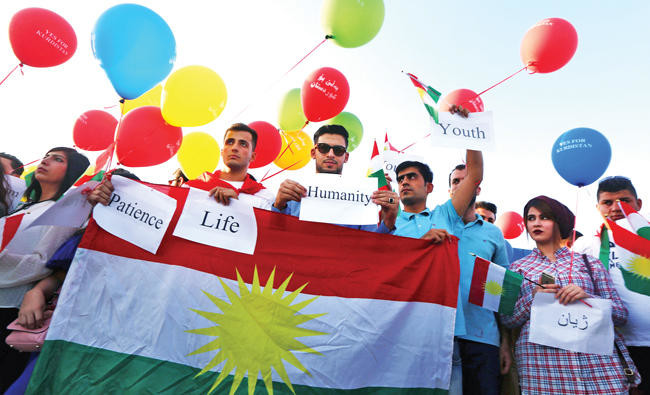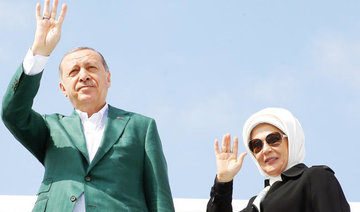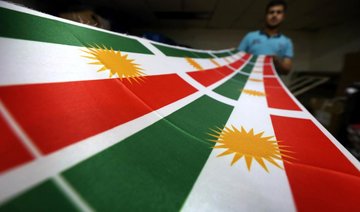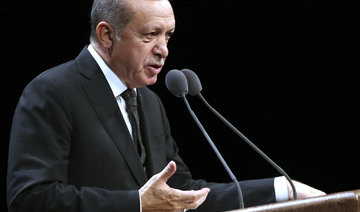ISTANBUL: Turkey’s President Tayyip Erdogan said on Saturday Iraqi Kurdish authorities would pay the price for an independence referendum, which was widely opposed by foreign powers.
Iraq’s Kurds overwhelmingly backed independence in Monday’s referendum, defying neighboring countries which fear the vote could fuel Kurdish separatism within their own borders and lead to fresh conflict.
“They are not forming an independent state, they are opening a wound in the region to twist the knife in,” Erdogan told members of his ruling AK Party in the eastern Turkish city of Erzurum.
“To ignore this reality benefits neither us, nor our Kurdish brothers in Iraq,” he said, calling on Iraqi Kurds to “wake up from this dream” of independence.
Erdogan has built strong commercial ties with Kurdish authorities in northern Iraq, which pump hundreds of thousands of barrels of oil daily through Turkey for export to world markets.
“We don’t regret what we did in the past. But since the conditions are changed and the Kurdish Regional Government (KRG), to which we provided all support, took steps against us, it would pay the price,” he said.
Separately, Erdogan said that Israel’s Mossad intelligence agency played a role in the vote, proved by the waving of Israeli flags during celebrations of the overwhelming “yes’ vote.
During a televised speech, Erdogan claimed that Turkey had been saddened to see some Iraqi Kurds acclaiming the independence referendum with Israeli flags.
“This shows one thing, that this administration (in northern Iraq) has a history with Mossad, they are hand-in-hand together,” Erdogan said in Erzurum, in eastern Turkey.
Israel has been the only country to openly support an independent Kurdish state, with Prime Minister Benjamin Netanyahu backing “the legitimate efforts of the Kurdish people to attain a state of its own.”
Erdogan has derided the Israeli support.
“Are you aware of what you are doing?” Erdogan said in an appeal to Iraqi Kurdish leaders. “Only Israel supports you.”
Ankara has threatened a series of measures to punish Iraqi Kurds, including shutting the land border between Turkey and the region and halting the transit of oil from Iraqi Kurdistan to the southern Turkish port of Ceyhan, an economic lifeline.
On Friday, the Turkish carriers Turkish Airlines, Atlas and Pegasus suspended their flights to Iraqi Kurdistan for an unspecified period of time.
Ankara had previously refused to engage in official contacts with Iraqi Kurds, fearing that any actions that could encourage the creation of an independent Kurdish state could embolden its own Kurds.
But as Turkey’s economy has boomed, Erdogan has moved to forge trade ties with Iraq’s Kurdistan region, helping make Iraq the second-largest market for Turkish exports last year, after Germany.
The Iraqi Kurdish leader Masoud Barzani has also become a frequent visitor to Turkey.
Business sources quoted in Turkish media have warned that the closure of the Habur border gate could harm $7 billion of trade between Ankara and Irbil.
Turkey has repeatedly threatened to impose economic sanction, effectively cutting their main access to international markets, and has held joint military exercises with Iraqi troops on the border.
However, after Erdogan said that Iraqi Kurds would go hungry if Ankara halted the cross-border flow of trucks and oil, it has said that any measures it took would not target civilians and instead focus on those who organized the referendum.
Iraq’s Defense Ministry said on Friday it plans to take control of the borders of the autonomous Kurdistan region in coordination with Iran and Turkey.
Turkish Prime Minister Bin Yildirim, speaking on Saturday, did not refer specifically to those plans, but said Ankara would no longer deal with Kurdish authorities in Irbil.
“From now on, our relationships with the region will be conducted with the central government, Baghdad,” he said. “As Iran, Iraq and Turkey, we work to ensure the games being played in the region will fail.”
Erdogan sees Israel’s hand in Iraqi Kurdistan vote
Erdogan sees Israel’s hand in Iraqi Kurdistan vote

Residents of Syria’s Quneitra are frustrated by lack of action to halt Israeli advance

Israeli forces entered the area — which lies in a UN-patrolled buffer zone in the Golan Heights that was established by a 1974 ceasefire agreement between Syria and Israel — soon after the fall of President Bashar Assad last month in the country’s 13-year civil war.
The Israeli military has also made incursions into Syrian territory outside of the buffer zone, sparking protests by local residents. They said the Israeli forces had demolished homes and prevented farmers from going to their fields in some areas. On at least two occasions, Israeli troops reportedly opened fired on protesters who approached them.
Residents of Quneitra, a seemingly serene bucolic expanse of small villages and olive groves, said they are frustrated, both by the Israeli advances and by the lack of action from Syria’s new authorities and the international community.
Rinata Fastas said that Israeli forces had raided the local government buildings but had not so far entered residential neighborhoods. Her house lies just inside of the newly blocked-off area in the provincial capital formerly called Baath City, after Assad’s former ruling party, and now renamed Salam City.
She said she is afraid Israeli troops may advance farther or try to permanently occupy the area they have already taken. Israel still controls the Golan Heights that it captured from Syria during the 1967 Mideast war and later annexed. The international community, with the exception of the US, regards it as occupied.
Fastas said she understands that Syria, which is now trying to build its national institutions and army from scratch, is no position to militarily confront Israel.
“But why is no one in the new Syrian state coming out and talking about the violations that are happening in Quneitra province and against the rights of its people?” she asked.
Syria’s new rulers are in no rush to confront Israel
The United Nations has accused Israel of violating the 1974 ceasefire agreement by entering the buffer zone.
Israeli Prime Minister Benjamin Netanyahu has said troops will stay on “until another arrangement is found that will ensure Israel’s security.” He was speaking from the snowy peak of Mount Hermon, Syria’s tallest mountain known as Jabal al Sheikh in Arabic, which has now been captured by Israeli forces.
An Israeli official, who spoke on condition of anonymity because he was not authorized to comment on the matter, said the military will remain in the area it has taken until it is satisfied that the new Syrian authorities do not pose a danger to Israel.
The new Syrian government has lodged a complaint with the UN Security Council about Israeli airstrikes and advances into Syrian territory.
But the issue does not appear to be a priority for Syria’s new rulers as they try to consolidate control over the country, turn a patchwork of former rebel factions into a new national army, and push for the removal of Western sanctions.
The country’s new de facto leader, Ahmad Al-Sharaa, head of the former Islamist insurgent group Hayat Tahrir Al-Sham, has also publicly said Syria is not seeking a military conflict with Israel and will not pose a threat to its neighbors or to the West.
In the meantime, residents of Quneitra have largely been left to fend for themselves.
In the village of Rafid, inside the buffer zone, locals said the Israeli military had demolished two civilian houses and a grove of trees as well as a former Syrian army outpost.
Mayor Omar Mahmoud Ismail said when the Israeli forces entered the village, an Israeli officer greeted him and told him, “I am your friend.”
“I told him, ‘You are not my friend, and if you were, you wouldn’t enter like this,’” Ismail said.
Locals who organized a protest were met with Israeli fire
In Dawaya, a village outside the buffer zone, 18-year-old Abdelrahman Khaled Al-Aqqa was lying on a mattress in his family home Sunday, still recovering after being shot in both legs. Al-Aqqa said he joined about 100 people from the area on Dec. 25 in protest against the Israeli incursion, chanting “Syria is free, Israel get out!”
“We didn’t have any weapons, we were just there in the clothes we were wearing,” he said. “But when we got close to them, they started shooting at us.”
Six protesters were wounded, according to residents and media reports. Another man was injured on Dec. 20 in a similar incident in the village of Maariyah. The Israeli army said at the time that it had fired because the man was quickly approaching and ignored calls to stop.
The Israeli military did not immediately respond to a request for comment on the Dec. 25 incident.
Adel Subhi Al-Ali, a local Sunni religious official, sat with his 21-year-old son, Moutasem, who was recovering after being shot in the stomach in the Dec. 25 protest. He was driven first to a local hospital that did not have the capacity to treat him, and then to Damascus where he underwent surgery.
When he saw the Israeli tanks moving in, “We felt that an occupation is occupying our land. So we had to defend it, even though we didn’t have weapons, ... It is impossible for them to settle here,” Al-Ali said.
Since the day of the protest, the Israeli army has not returned to the area, he said.
Al-Ali called for the international community to “pressure Israel to return to what was agreed upon with the former regime,” referring to the 1974 ceasefire agreement, and to return the Golan Heights to Syria.
But he acknowledged that Syria has little leverage.
“We are starting from zero, we need to build a state,” Al-Ali said, echoing Syria’s new leaders. “We are not ready as a country now to open wars with another country.”
‘Protect our people’: Armed Syrian volunteers watch over Damascus

- Local committees have taken over some of the deserted checkpoints, with the authorities’ approval
- Committees had been set up to patrol neighborhoods to prevent crime until the police could take over
DAMASCUS: Every night, Damascus residents stand guard outside shops and homes armed with light weapons often supplied by Syria’s new rulers, eager to fill the security vacuum that followed the recent takeover.
After Islamist-led militants ousted former president Bashar Assad in early December, thousands of soldiers, policemen and other security officials deserted their posts, leaving the door open to petty theft, looting and other crimes.
The new Syrian authorities now face the mammoth challenge of rebuilding state institutions shaped by the Assad family’s five-decade rule, including the army and security apparatuses that have all but collapsed.
In the meantime, Damascenes have jumped into action.
In the Old City, Fadi Raslan, 42, was among dozens of people cautiously watching the streets, his finger on the trigger of his gun.
“We have women and elderly people at home. We are trying to protect our people with this volunteer-based initiative,” he said.
“Syria needs us right now, we must stand together.”
Local committees have taken over some of the deserted checkpoints, with the authorities’ approval.
Hussam Yahya, 49, and his friends have been taking turns guarding their neighborhood, Shughur, inspecting vehicles.
“We came out to protect our neighborhoods, shops and public property as volunteers, without any compensation,” he said.
He said the new authorities, led by the Islamist Hayat Tahrir Al-Sham group, have backed their initiative, providing light arms and training.
Authorities also provided them with special “local committee” cards, valid for a year.
Police chief Ahmad Lattouf said the committees had been set up to patrol neighborhoods to prevent crime until the police could take over.
“There aren’t enough police officers at the moment, but training is ongoing to increase our numbers,” he said.
The Damascus committees begin their neighborhood watches at 22:00 (19:00 GMT) every night and end them at 06:00 (03:00 GMT) the next morning.
Further north, in the cities of Aleppo and Homs, ordinary residents have also taken up weapons to guard their districts with support from authorities, residents said.
The official page of the Damascus countryside area has published photos on Telegram showing young men it said were “volunteering” to protect their town and villages “under the supervision of the Military Operations Department and in coordination with General Security.”
It also said others were volunteering as traffic police.
A handful of police officers affiliated with the Salvation Government of the Idlib region, the militant bastion controlled by HTS before Assad’s fall, have also been deployed in Damascus.
Traffic policemen have been called from Idlib to help, while HTS gunmen are everywhere in the capital, especially in front of government buildings including the presidential palace and police headquarters.
The authorities have also begun allowing Syrians to apply to the police academy to fill its depleted ranks.
Syria’s new rulers have called on conscripts and soldiers to surrender their weapons at dedicated centers.
Since rising to power, HTS and its allies have launched security sweeps in major cities including Homs and Aleppo with the stated goal of rooting out “remnants of Assad’s militias.”
In the capital’s busy Bab Touma neighborhood, four local watchmen were checking people’s IDs and inspecting cars entering the district.
Fuad Farha said he founded the local committee that he now heads after offering his help to “establish security” alongside the HTS-affiliated security forces.
“We underwent a quick training, mainly teaching us how to assemble weapons and take them apart and to use rifles,” he said.
Residents said that the committees had been effective against burglars and thieves.
“We all need to bear responsibility for our neighborhood, our streets and our country,” Farha said.
“Only this way will we be able to rebuild our country.”
Macron says West must be cautious over new Syria rulers

PARIS: French President Emmanuel Macron said on Monday the West must not be naive about the new authorities in Syria after the ousting of Bashar Assad and promised France would not abandon Kurdish fighters.
“We must regard the regime change in Syria without naivety,” Macron said in a speech to French ambassadors after Islamist-led forces toppled Assad last month, adding France would not abandon “freedom fighters, like the Kurds” who are fighting extremist groups in Syria.
UN: Over 30 million in need of aid in war-torn Sudan

- Tens of thousands of people have been killed and more than eight million internally displaced
- Both the army and the RSF have been accused of using starvation as a weapon of war
PORT SUDAN, Sudan: More than 30 million people, over half of them children, are in need of aid in Sudan after twenty months of war, the United Nations said on Monday.
The UN has launched a $4.2 billion call for funds, targeting 20.9 million people across Sudan from a total of 30.4 million people it said are in need in what it called “an unprecedented humanitarian crisis.”
Sudan has been torn apart and pushed to the brink of famine by the war that erupted in April 2023 between the Sudanese army and the paramilitary Rapid Support Forces (RSF).
Tens of thousands of people have been killed and more than eight million internally displaced, which, in addition to 2.7 million displaced before the war, has made Sudan the world’s largest internal displacement crisis.
A further 3.3 million people have fled across Sudan’s borders to escape the war, which means over a quarter of the country’s pre-war population, estimated at around 50 million, are now uprooted.
Famine has already been declared in five areas in Sudan and is expected to take hold of five more areas by May, with 8.1 million people currently on the brink of mass starvation.
Sudan’s army-aligned government has denied there is famine, while aid agencies complain that access is blocked by bureaucratic hurdles and ongoing violence.
Both the army and the RSF have been accused of using starvation as a weapon of war.
For much of the conflict, the UN has struggled to raise even a quarter of the funds it has targeted for its humanitarian response in the impoverished northeast African country.
Sudan has often been called the world’s “forgotten” war, overshadowed by conflicts in the Middle East and Ukraine despite the scale of the horrors inflicted upon civilians.
Jordanian FM discusses rebuilding Syria in Turkiye talks

DUBAI: The Jordanian Foreign Minister Ayman Safadi highlighted on Tuesday the need to help Syria regain its security, stability, and sovereignty during discussions in Turkiye.
Talks also focused on providing support to the Syrian people and addressing the challenge of rebuilding the war-torn country.
He underscored Jordan's firm stance against any aggression on Syria’s sovereignty, rejecting Israeli attacks on Syrian territory.
The minister also expressed solidarity with Turkey, supporting its rights in confronting the Kurdistan Workers' Party (PKK), emphasizing the importance of regional cooperation to ensure peace and stability.
















